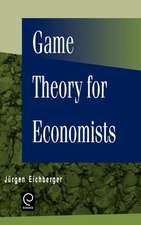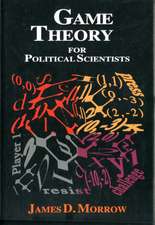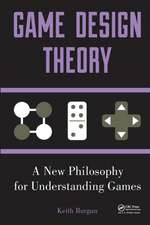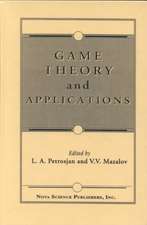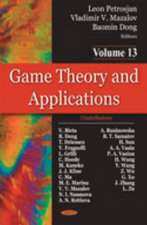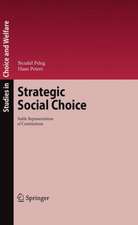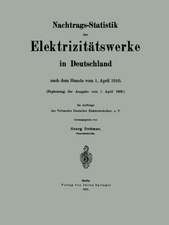Game Theory: A Multi-Leveled Approach: Springer Texts in Business and Economics
Autor Hans Petersen Limba Engleză Paperback – noi 2016
| Toate formatele și edițiile | Preț | Express |
|---|---|---|
| Paperback (2) | 430.02 lei 38-45 zile | |
| Springer – 5 noi 2014 | 430.02 lei 38-45 zile | |
| Springer Berlin, Heidelberg – noi 2016 | 467.05 lei 6-8 săpt. | |
| Hardback (1) | 601.13 lei 6-8 săpt. | |
| Springer Berlin, Heidelberg – 12 iun 2015 | 601.13 lei 6-8 săpt. |
Din seria Springer Texts in Business and Economics
- 17%
 Preț: 460.17 lei
Preț: 460.17 lei -
 Preț: 548.25 lei
Preț: 548.25 lei - 17%
 Preț: 490.71 lei
Preț: 490.71 lei - 13%
 Preț: 447.86 lei
Preț: 447.86 lei - 19%
 Preț: 509.83 lei
Preț: 509.83 lei -
 Preț: 360.02 lei
Preț: 360.02 lei -
 Preț: 374.88 lei
Preț: 374.88 lei - 17%
 Preț: 523.87 lei
Preț: 523.87 lei -
 Preț: 374.15 lei
Preț: 374.15 lei -
 Preț: 185.09 lei
Preț: 185.09 lei - 17%
 Preț: 522.65 lei
Preț: 522.65 lei - 19%
 Preț: 465.61 lei
Preț: 465.61 lei - 15%
 Preț: 642.51 lei
Preț: 642.51 lei - 18%
 Preț: 754.79 lei
Preț: 754.79 lei - 19%
 Preț: 534.44 lei
Preț: 534.44 lei -
 Preț: 360.47 lei
Preț: 360.47 lei -
 Preț: 359.93 lei
Preț: 359.93 lei - 17%
 Preț: 363.29 lei
Preț: 363.29 lei - 17%
 Preț: 363.98 lei
Preț: 363.98 lei -
 Preț: 473.41 lei
Preț: 473.41 lei -
 Preț: 361.12 lei
Preț: 361.12 lei - 8%
 Preț: 428.31 lei
Preț: 428.31 lei - 15%
 Preț: 479.55 lei
Preț: 479.55 lei - 13%
 Preț: 490.93 lei
Preț: 490.93 lei - 15%
 Preț: 650.55 lei
Preț: 650.55 lei -
 Preț: 382.19 lei
Preț: 382.19 lei - 15%
 Preț: 562.13 lei
Preț: 562.13 lei -
 Preț: 367.41 lei
Preț: 367.41 lei -
 Preț: 401.79 lei
Preț: 401.79 lei -
 Preț: 361.89 lei
Preț: 361.89 lei - 15%
 Preț: 562.31 lei
Preț: 562.31 lei - 17%
 Preț: 491.52 lei
Preț: 491.52 lei - 20%
 Preț: 819.24 lei
Preț: 819.24 lei - 15%
 Preț: 597.20 lei
Preț: 597.20 lei -
 Preț: 320.05 lei
Preț: 320.05 lei - 20%
 Preț: 694.03 lei
Preț: 694.03 lei - 20%
 Preț: 693.46 lei
Preț: 693.46 lei -
 Preț: 548.53 lei
Preț: 548.53 lei - 17%
 Preț: 459.67 lei
Preț: 459.67 lei - 17%
 Preț: 366.16 lei
Preț: 366.16 lei - 20%
 Preț: 693.82 lei
Preț: 693.82 lei -
 Preț: 555.90 lei
Preț: 555.90 lei - 9%
 Preț: 766.64 lei
Preț: 766.64 lei
Preț: 467.05 lei
Nou
89.37€ • 95.57$ • 74.51£
Carte tipărită la comandă
Livrare economică 18 aprilie-02 mai
Specificații
ISBN-10: 3662518775
Pagini: 511
Ilustrații: XVII, 494 p. 89 illus.
Dimensiuni: 155 x 235 x 26 mm
Greutate: 0.71 kg
Ediția:Softcover reprint of the original 2nd ed. 2015
Editura: Springer Berlin, Heidelberg
Colecția Springer
Seria Springer Texts in Business and Economics
Locul publicării:Berlin, Heidelberg, Germany
Cuprins
Recenzii
“This book is therefore a very successful work on the task of providing the largest number of readers, independently of the initial levels of knowledge, an introduction to game theory simultaneously accessible and rigorous, with a wide exemplification of applications, allowing them to achieve efficiently an advanced level of knowledge in the field. Indispensable for teachers and both undergraduate and graduate students in game theory. Also for business and economicsprofessionals, and everybody curious on these matters.” (Manuel Alberto M. Ferreira, Acta Scientiae et Intellectus, Vol. 2 (4), 2016)
Notă biografică
He is Professor of Quantitative Economics, in particular Mathematical Economics, at the Department of Quantitative Economics, School of Business and Economics, Maastricht University. He is also Honorar Professor at the Rheinisch-Westfälische Technische Hochschule, Aachen, Germany.
He is a Fellow of the Society for the Advancement of Economic Theory SAET.
His main research interests are game theory and social choice theory, and he is currently an editor of Social Choice and Welfare, Games and Economic Behavior, and Mathematical Social Sciences, and main editor of the Theory and Decision Library Series C: Game Theory, Social Choice, Decision Theory, and Optimization,published by Springer (http://www.springer.com/series/6618).
Textul de pe ultima copertă
Caracteristici
Descriere
This book is a compilation of much of the material I used for various game theory courses over, roughly, the past two decades. The ?rst part, ThinkingStrategically, is intended for undergraduatestudents in economics or business, but can also serve as an introduction for the subsequent parts of the book. The second and third parts go deeper into the various topics treated in the ?rst part. These parts are intended for more mathematically oriented undergraduate students, or for graduate students in (for instance) economics. Part II is on noncooperative games and Part III on co- erative games. Part IV is only a mathematical tools chapter. Every chapter has a ?nal section with problems. Selected hints, answers, and solutions to these pr- lems are given at the end of the book. Complete solutions can be obtained from the author. The book claims neither originality nor completeness. As to originality, the material draws heavily on game theory texts developed by many others, often in collaboration. I mention in particular Jean Derks, Thijs Jansen, Andres Perea, Ton Storcken, Frank Thuijsman, Stef Tijs, Dries Vermeulen, and Koos Vrieze. I am also greatly indebted to a large numberof introductory, intermediate, and advancedtexts and textbookson game theory, and hope I have succeeded in giving suf?cient credit to the authors of these works in all relevant places.

